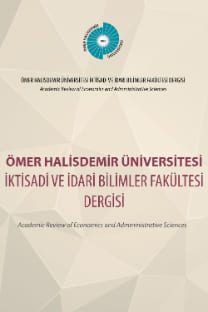Muhammed Akpai AMADE, Isyaku MOHAMMED, Eniola Victoria IBISANMI, Ayobami Temitope OWOLABI, Udi JOSHUA
Interaction between domestic investment foreign direct investment and economic growth in Nigeria
The most inclusive definitions of economic growth always include the best utilisation of native resources in addition to increasing GDP and integration into the global market. As a result, the impact of domestic investment in an economy is one of the most examined subjects in capital movement and economic development. Flowing this, the aim of this study was to evaluate the effects of domestic investment on the economic growth of Nigeria. The objectives were to assess the growth of the economy of Nigeria from 1981 to 2018, determine the relationship of domestic investment on the Nigerian economy, evaluate the relationship of foreign direct investment on the economy of Nigeria, and determine the association between capital inflow and the Nigerian economy. Using secondary time series data obtained for domestic investment, foreign direct investment, exchange rate, and interest rate – from Nigerian Central Bank Statistical Bulletin and World Development Indicators, Autoregressive Distributed Lags (ARDL) technique was employed in estimating the short term and long run dynamics. The results revealed that foreign direct investment (t = 2.2385, p = 0.033) and interest rate (t = -2.5141, p = 0.0177) are the only significant determinants of real GDP in the short term, while the significant long run exponents are domestic investment (t = 139.5577, p = 0.0000), foreign direct investment (t = -3.2445, p = 0.0026) and exchange rate (t = -2.8316, p = 0.0071). Furthermore, the Granger Causality test revealed that both domestic investment and foreign direct investment cause economic growth. Therefore, the study recommended, among others, that policy makers optimise local investment options and normalize exchange rate and trade operations.
Anahtar Kelimeler:
Domestic investment, FDI, economic growth
Interaction between domestic investment foreign direct investment and economic growth in Nigeria
The most inclusive definitions of economic growth always include the best utilisation of native resources in addition to increasing GDP and integration into the global market. As a result, the impact of domestic investment in an economy is one of the most examined subjects in capital movement and economic development. Flowing this, the aim of this study was to evaluate the effects of domestic investment on the economic growth of Nigeria. The objectives were to assess the growth of the economy of Nigeria from 1981 to 2018, determine the relationship of domestic investment on the Nigerian economy, evaluate the relationship of foreign direct investment on the economy of Nigeria, and determine the association between capital inflow and the Nigerian economy. Using secondary time series data obtained for domestic investment, foreign direct investment, exchange rate, and interest rate – from Nigerian Central Bank Statistical Bulletin and World Development Indicators, Autoregressive Distributed Lags (ARDL) technique was employed in estimating the short term and long run dynamics. The results revealed that foreign direct investment (t = 2.2385, p = 0.033) and interest rate (t = -2.5141, p = 0.0177) are the only significant determinants of real GDP in the short term, while the significant long run exponents are domestic investment (t = 139.5577, p = 0.0000), foreign direct investment (t = -3.2445, p = 0.0026) and exchange rate (t = -2.8316, p = 0.0071). Furthermore, the Granger Causality test revealed that both domestic investment and foreign direct investment cause economic growth. Therefore, the study recommended, among others, that policy makers optimise local investment options and normalize exchange rate and trade operations.
Keywords:
domestic investment, FDI, economic growth,
___
- Abdulmumini, B. A., & Tukur, G. (2012). The relationship between domestic investment and economic growth in Nigeria. International Journal of Research in Social Sciences, 2(3), 256-279.
- Adams, S. (2009). Foreign direct investment, domestic investment, and economic growth in Sub-Saharan Africa. Journal of Policy Modelling, 31(6), 939-949.
- Adegbike, E. O., & Owulabi, S. I. (2007). A communique read on economic reform. 1st National Finance and Banking Conference on Economic reform and the Nigerian Financial System. Lagos: University of Lagos.
- Adegbite, E. O., & Adetiloye, K. A. (2013). Financial globalization and domestic investment in developing countries: evidence from Nigeria. Mediterranean Journal of Social Sciences, 6(4), 213-221.
- Adeleke, A. M. (2014). Saving-growth nexus in an oil-rich exporting country: a case of Nigeria. Management science and Engineering. Retrieved from http://www.cscanada.net/index.php/mse/article/view/5417
- Adigwe, P. K., Ezeagba, C. E., & Francis, N. P. (2015). Effect of foreign direct investment on Nigerian economic growth. European Journal of Research and Reflection in Management Sciences, 3(5), 28-34.
- Agénor, P., & Montiel, P. J. (2008). Development macroeconomics (3 ed.). Princeton: Princeton University Press.
- Ajayi, L. B., & Oke, M. O. (2012). Effect of external debt on economic growth and development of Nigeria. International Journal of Business and Social Science, 3(2), 297-304.
- Akanbi, O. A. (2010). Role of governance in explaining domestic investment in Nigeria. Department of Economics, University of Pretoria(168).
- ISSN: 2564-6931
- Yayın Aralığı: Yılda 4 Sayı
- Başlangıç: 2008
- Yayıncı: NİĞDE ÖMER HALİSDEMİR ÜNİVERSİTESİ
Sayıdaki Diğer Makaleler
Türk imalat sanayinin genel görünümü ve seçilmiş ülkelerle karşılaştırılması
Mutlu Başaran ÖZTÜRK, Mehmet Sinan ÇELİK, Derya DAŞTAN
Kahramanmaraş ili özelinde hazırlanan il afet risk azaltma planı (İRAP) üzerine bir çalışma
Olumlu çocukluk yaşantılarının bireysel yaratıcılıkla ilişkisinde öz-saygının aracılık etkisi
Interaction between domestic investment foreign direct investment and economic growth in Nigeria
Muhammed Akpai AMADE, Isyaku MOHAMMED, Eniola Victoria IBISANMI, Ayobami Temitope OWOLABI, Udi JOSHUA
Konut piyasasında çoklu balon oluşumu: Türkiye geneli ve TR71 bölgesinden ampirik deliller
